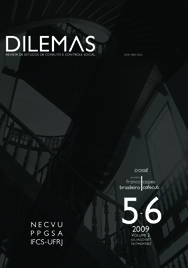Três mulheres no nazismo: Reflexões sobre as fontes do comportamento moral
Keywords:
moral, nazismo, Traudl Junge, Sophie Scholl, Leni RiefenstahlAbstract
Este trabalho discute as fontes do comportamento moral. Seu ponto de partida é a crítica feita à sociologia da moral durkheimiana por Zygmunt Bauman, que problematiza os pressupostos da origem social da moral e sua natureza coercitiva. Bauman contrapropõe, com base nas obras de Hannah Arendt e Emmanuel Lévinas, uma concepção de moralidade cujo núcleo é a responsabilidade para com o outro. A discussão é empreendida com base em três filmes que retratam cada qual a trajetória de uma mulher durante o nazismo: Traudl Junge, Sophie Scholl e Leni Riefenstahl. O eixo da análise é o modo como responsabilidade, culpa e consciência se entrelaçam em suas trajetórias.
This article discusses the sources of moral behaviour. Its point of departure is Zygmunt Bauman's criticism of the Durkheimian sociology of morality, challenging the assumptions of the social origin of morality and its coercive nature. Drawing on Hannah Arendt's and Emmanuel Levinas' works, Bauman counter-proposes a concept of morality based on responsibility toward each other. The discussion is then developed in relation to three fi lms that portray, each in their own way, the experience of a woman during the Nazi regime: Traudl Junge, Sophie Scholl and Leni Riefenstahl. The analysis is centred on how responsibility, guilt and conscience intertwine in the course of those lives.
Downloads
Published
Issue
Section
License
Upon submitting a text, the authors retain copyright and grant DILEMAS - Revista de Estudos de Conflito e Controle Social the right of first publication, with the work simultaneously licensed under the Creative Commons License type attribution BY (CC-BY), which permits sharing of the work with acknowledgment of authorship and initial publication in this journal.

